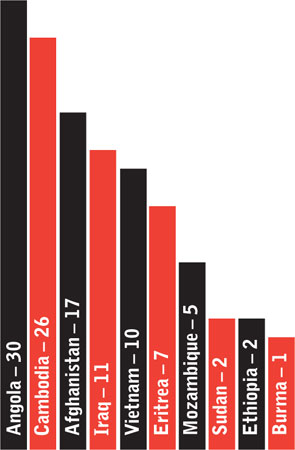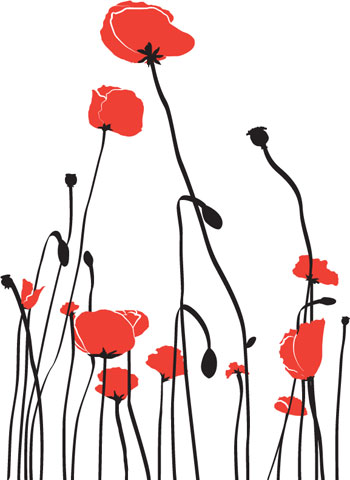The Book of the Poppy (12 page)
Read The Book of the Poppy Online
Authors: Chris McNab

Looking across the UK, we find repeated examples of organisations and individuals investing in the support of its current and former military personnel. On 4 June 2010, for example, Prince William of Wales opened the Help for Heroes Rehabilitation Complex at Headley Court, a state-of-the-art facility for aiding the recovery of seriously wounded individuals. Costing £8.5 million to establish, the facility includes a 25-metre swimming pool, a sprung-floor sports hall, a cardiovascular gym with anti-gravity treadmill, numerous treatment rooms and also a gait analysis centre, which helps patients learn to walk with prosthetic limbs. With a different focus is Combat Stress UK, a charity devoted purely to the ‘treatment and support of British Armed Forces Veterans who have mental health problems’. Through providing free treatment to veterans, particularly those suffering from PTSD, the charity helps numerous individuals, old and young, enabling them to cope with their psychological wounds and move forward in life. The Army Widows’ Association, by contrast, focuses its work on providing friendship and support for those who have lost husbands, wives or partners in military service, the assistance ranging from help in finding employment through to one-to-one counselling.
Encouragingly, the list goes on. Military charities and support organisations include Blind Veterans UK, the Burma Star Association, the Royal Air Force Benevolent Fund, Royal Navy and Royal Marines Charity, Veteran’s Aid and the Forces Pension Society. Taken together, such organisations signal that thousands of people care enough to dedicate themselves to the welfare of serving and former military personnel. It is important work, if only for the reason that it sends a message of appreciation to the armed forces.
AMPUTEES FROM LANDMINES, PER 10,000 INHABITANTS

This is not a jingoistic statement. It is made with the full awareness that not everyone will agree with the conflicts in which soldiers, sailors and airmen serve. Yet the point remains that on a human level, soldiers are compelled, frequently on our behalf, to go out and face situations that are dangerous in the extreme, and which threaten their very existence. It is on account of their humanity, not necessarily the causes for which they fight, that they deserve our support.
NOT EVERYONE AGREES
with the sentiments behind the poppy. In recent years, several high-profile individuals have levelled various charges against poppy wearing, with the accusations ranging from the glorification or war through to the trivialising of the dead. Some say that the poppy is a blind act of patriotism, a sentimentalising of violence that actually prevents us from seeing the horror, moral complexity and reality of what actually happens in conflict.
There is, it has to be admitted, a danger in wearing any symbol linked to war. We can never see the motivations of those who buy and wear the Remembrance Poppy. Many will buy one largely without thinking, dropping the coin into the charity box while rushing on to some other appointment. Others, by contrast, might wear the poppy through nationalistic motivations, seeing it as a distinctly British and oppositional act of patriotism. Some may even wear the poppy simply because everyone else is.
We can never, nor should we, control the tapestry of reasons for which people buy the poppy. I would argue, however, that the poppy does have an aggregate positive effect on both society and the individual. For a start, the poppy is not an isolated purchase, but is tied to a distinct period in the national calendar, culminating in the profound two-minute silence on Remembrance Day.
When the nation stops, it is compelled to reflect on war and its consequences, and in that moment the poppy really comes alive in its meaning and power. For the rest of the year, most of our attention is soaked up by the daily realities of work and family. When we buy a poppy, however, we might pause, just for a second, and step out of our own narrative to reflect on the magnitude of war. Once we do that, we raise the chances of being more engaged with the realities of war, not more distant from them.
The poppy is also about education. The world wars are becoming ever-more distant in time, and for the younger generations these conflicts are starting to subside into the history books. We have to be honest about this and accept that time does change our relationship to events. The Seven Years’ War was doubtless traumatic for millions of people around the world when it occurred, but dozens of generations have been born and died since those days, so the war’s impact is no longer felt on an emotional level. However, the Remembrance Poppy is not just about the First World War, Second World War, the Falklands War, the war in Afghanistan, or indeed any specific conflict. The poppy compels us to address war in general, and ask fundamental questions. Why does it happen? What is it like? Who suffers? Who helps those who suffer? It also directs our attention to the conflicts that are ongoing – even as I write these words, people continue to fight and die, whether on their home soil or in a foreign land.
It is a sad fact that war is a constant visitor to our planet. The poppy will always, therefore, be relevant. What it says is that by not forgetting those who have died in the past, there are seeds of hope for the future.
BOOKS
Arthur, Max,
Forgotten Voices of the Great War: A New History of WWI in the Words of the Men and Women Who Were There
(London; Ebury Press, 2003)
Frank, Anne,
The Diary of Anne Frank
(London; Doubleday Books, 2003)
Hastings, Max,
All Hell Let Loose: The World at War 1939–1945
(London; Harper Press, 2012)
Hennesey, Patrick,
The Junior Officers’ Reading Club: Killing Time and Fighting Wars
(London; Penguin 2010)
Holmes, Richard (ed.),
The Oxford Companion to Military History
(Oxford; OUP, 2001)
Holmes, Richard,
Tommy: The British Soldier on the Western Front 1914–18
(London; Harper Collins, 2004)
Keegan, John,
The Face of Battle: A Study of Agincourt, Waterloo and the Somme
(London; Pimlico, 2004)
MacDonald, Lyn
Passchendaele: The Story of the Third Battle of Ypres 1917
(London; Penguin, 1993)
Price, Sian,
If You Are Reading This …: Last Letters from the Front Line
(Barnsley; Frontline Books, 2011)
Sajer, Guy,
The Forgotten Soldier
(London; Cassell Military, 1999)
Saunders, Nicholas J.,
The Poppy: A Cultural History from Ancient Egypt to Flanders Fields to Afghanistan
(London; Oneworld publications, 2013)
Stallworthy, Jon,
The Oxford Book of War Poetry
(Oxford; OUP, 2008)
Willmot, H.P.
World War I
(London; Dorling Kindersely, 2009)
VETERAN SUPPORT ORGANISATIONS
Army Benevolent Fund –
www.soldierscharity.org
Army Widows Association –
www.armywidows.org.uk
Combat Stress –
www.combatstress.org.uk
Help for Heroes –
www.helpforheroes.org.uk
Royal Air Force Benevolent Fund –
www.rafbf.org
Royal Navy and Royal Marines Charity – rnrmc.org.uk
Soldiers, Sailors, Airmen and Families Association (SSAFA) –
www.ssafa.org.uk
The Royal British Legion –
www.britishlegion.org.uk
MAJOR UK MUSEUMS
Bletchley Park –
www.bletchleypark.org.uk
Cardiff Castle Museum of the Welsh Soldier –
www.cardiffcastlemuseum.org.uk
Eden Camp –
www.edencamp.co.uk
Edinburgh Castle/National War Museum –
www.edinburghcastle.gov.uk
Fleet Air Arm Museum –
www.fleetairarm.com
Imperial War Museum –
www.iwm.org.uk
Royal Air Force Museum – rafmuseum.org.uk
Royal Naval Museum –
www.royalnavalmuseum.org
The Tank Museum –
www.tankmuseum.org

First published in 2014
The History Press
The Mill, Brimscombe Port
Stroud, Gloucestershire,
GL
5 2
QG
This ebook edition first published in 2014
All rights reserved
© Chris McNab, 2014
The right of Chris McNab to be identified as the Author of this work has been asserted in accordance with the Copyright, Designs and Patents Act 1988.
This ebook is copyright material and must not be copied, reproduced, transferred, distributed, leased, licensed or publicly performed or used in any way except as specifically permitted in writing by the publishers, as allowed under the terms and conditions under which it was purchased or as strictly permitted by applicable copyright law. Any unauthorised distribution or use of this text may be a direct infringement of the author’s and publisher’s rights, and those responsible may be liable in law accordingly.
EPUB ISBN
978 0 7509 6126 4
Original typesetting by The History Press
Ebook compilation by RefineCatch Limited, Bungay, Suffolk

